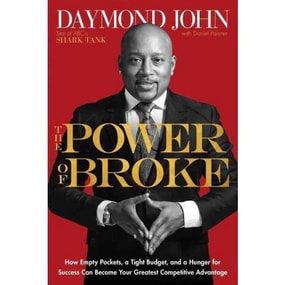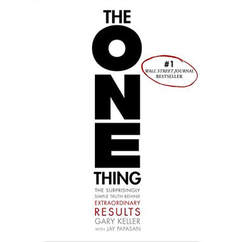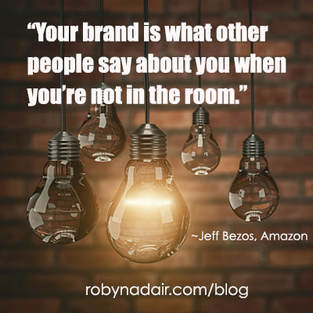 Daymond John’s “The Power of Broke” isn’t necessarily a collection of new advice but rather common sense offered in an authentic, easy to read book that also adds his own SHARK Point Basics. The book tells the stories of a variety of entrepreneurs, as well as offering up John’s entrepreneurial story. It also preaches that being broke should make us hungrier for success. When we are handed something without struggling for it, we waste those resources. I found several favorite stories in the book, including the story about about professional skateboarder and entrepreneur Rob Dyrdek. Johns says Dyrdek ultimately found success by “being real, being genuine, and being relentless in pursuit of what he wanted.” “Relentless in pursuit..." Isn’t that what perseverance is? As business owners and entrepreneurs, there are always going to be times when we want to give up. No matter how hard we work, how much we try, where we advertise or how we market, we meet with resistance of some sort. It’s those times when we need to persevere… be relentless in pursuit of what we want. It is the same when training for a race, no matter the distance. We have to be relentless in every detail, from nutrition to training, from rest to mindset. If we want to PR or get on the age group podium, we need to persevere through the crappy runs, bad weather and time management issues that crop up. This doesn’t mean we overtrain or run through injuries—it means we persevere through those difficulties. It is the same in entrepreneurship. Do you know what you want? Do you know your purpose? If you want it bad enough, you need to persevere. As Monday’s quote said, “Perseverance is not all one race; it is many short races one after the other.” In training for a race, you have many short “races” you do before your actual race: speed work, easy runs, nutrition, adequate rest… all of the things you need to work toward a PR. As a business owner, you are going to have short races every day as well: finances, marketing, getting your product out the door, paying your employees. You keep working toward what you want. You persevere. You relentlessly pursue your goal. Are you a small business owner without a marketing department? Are you frustrated or confused about marketing your business? Contact me to develop a marketing plan, marketing budget, or marketing content calendar that will help make your life a little easier!
0 Comments
 I recently watched a great TED talk by Caroline Paul about encouraging girls be adventurous. My most recent adventure was biking the Elroy-Sparta trail; however, I grew up riding horses. As a matter of fact, from ages 4 to probably 7, I was turfed on a daily basis by a recalcitrant (i.e. typical LOL!) Shetland pony who found great joy and pleasure in finding new and innovative ways to have me meet the dirt. My parents were always watching but they weren’t overprotective by any means. If I fell off, I was expected to get up and get back on unless I was seriously hurt (which never happened; mostly, my pride was a bit dented!) So that’s what I did. It’s that lesson that I took with me into adulthood as well. If you fell off, you got up, dusted yourself off and got back on, whether it was a failed relationship, a job loss, a business setback. I tried to raise my daughter in the same way. Yes, I told her to be careful when she was heading into situations where, as a female, you just need to pay attention (an unfortunate fact of life, but a fact nonetheless.) When she fell off one of the horses, I asked her if she was okay and then boosted her back up on the horse. I believe it’s a lesson that has helped her succeed with her new business and her life. She is willing to adventure outside of her comfort zone and take risks, just like her momma. What about you? Were your parents always telling you to be careful when you went outside to play? If they encouraged you to be adventurous, how do you think that has helped you succeed in life?  What is your one thing? Your purpose? This is the question Gary Keller’s book, “The One Thing” asks of you. I just finished the it and although “The One Thing” and my SELF Journal are not related, they do intertwine. Keller’s philosophy is we need to find our one big thing. This is our purpose and we need to set priorities in order to achieve that purpose. The priorities are the steps we must take to realize our purpose. This is not unlike the SELF Journal philosophy, which asks us to choose a big goal(s). We then set down the steps and daily targets we need to do to achieve that big goal. Both philosophies stress that we should not live for the “to do list” nor should we place importance on multi-tasking our way through life. We should instead focus on the end goal, our One Thing, and do the daily steps necessary to reach that destination. Keller says, “Live with purpose and you know where you want to go. Live by priority and you’ll know what to do to get there.” Makes sense, doesn’t it? If you get a chance, pick up the book. It will make you think about your purpose and maybe help you do more than go through the motions of the day.  What does your employer brand say about your organization? What do your employees say about your employer brand? If you haven't given any thought to it, you should. Your employer brand will continue to play more and more of a role in attracting and keeping talent. Your organization’s brand and your employer brand are intertwined. Many times, potential employees may also be customers. Your organization has already developed brand attributes (or at least it should have.) You should look to those attributes to create your employer brand. Do you have a marketing department? Involve them in the development. The brands should be consistent with each other and working with marketing will help maintain that consistency. If you don't have a marketing department,here are three points to keep in mind when developing your employer brand: 1) Be specific. What pain points does your consumer brand solve? How do your employees play a role in solving a client’s pain points? Stick to that. Your organizational mission may be fairly vague or generic but your employer brand needs to be specific, just as your consumer brand is specific. Don’t try to be all things to all people. 2) Be self-aware. Take a look at what is really happening in your organization. What do your employees say about your organization and brand? Why are people successful within your organization? If your employees don’t understand the organization’s purpose, mission and values—or worse, don’t care—you have to ask yourself, where is the disconnect? And how can that disconnect be reconciled? Do your current employees know why their job is important to the organization’s purpose, mission, values—and ultimately, its success? What message are they sending out to clients, potential clients and also potential talent? It isn’t always fun to take a hard look at what isn’t working within your organization, but those employees are also your brand ambassadors. 3) Be consistent. Your employer brand should be consistent with the consumer brand. This includes everything from the brand’s promise to its elements. And there must be consistency within the employer brand. For example, let's talk about voice. What is voice? It’s the tone of an organization's communications (i.e. formal vs. informal.) That voice needs to be consistent on all channels of communications: social media, website, email campaigns, and any other consumer/employee touch points. If your organization presents itself as down to earth and informal in social media, it would be inconsistent to take a very formal tone in the company newsletter. An inconsistent voice confuses and potentially alienates potential consumers/employees from your brand and comes across as inauthentic. Following these three tips can help make developing your employee brand an easier process. If you're overwhelmed, let me help develop your employer or consumer brand! |
Robyn AdairSenior Portraits Categories
All
Archives
July 2024
|
 RSS Feed
RSS Feed